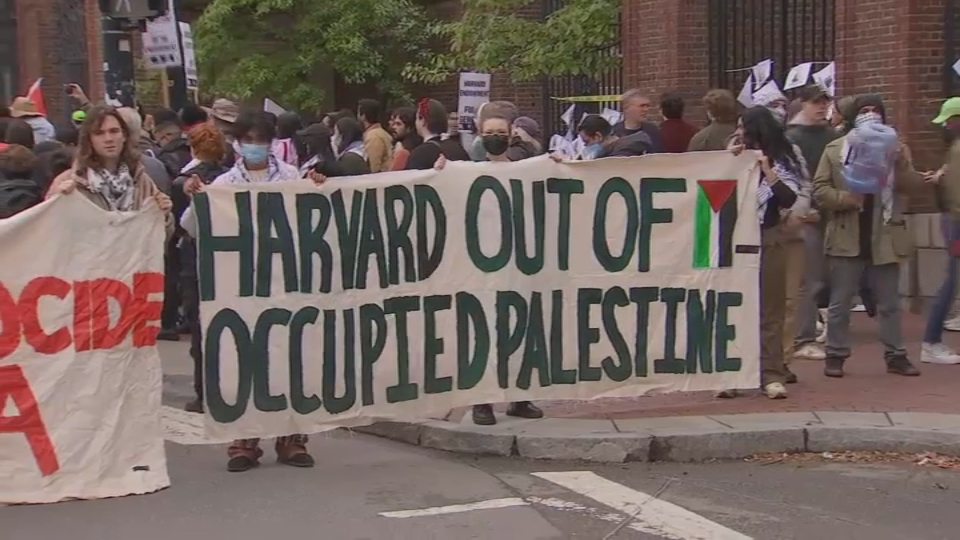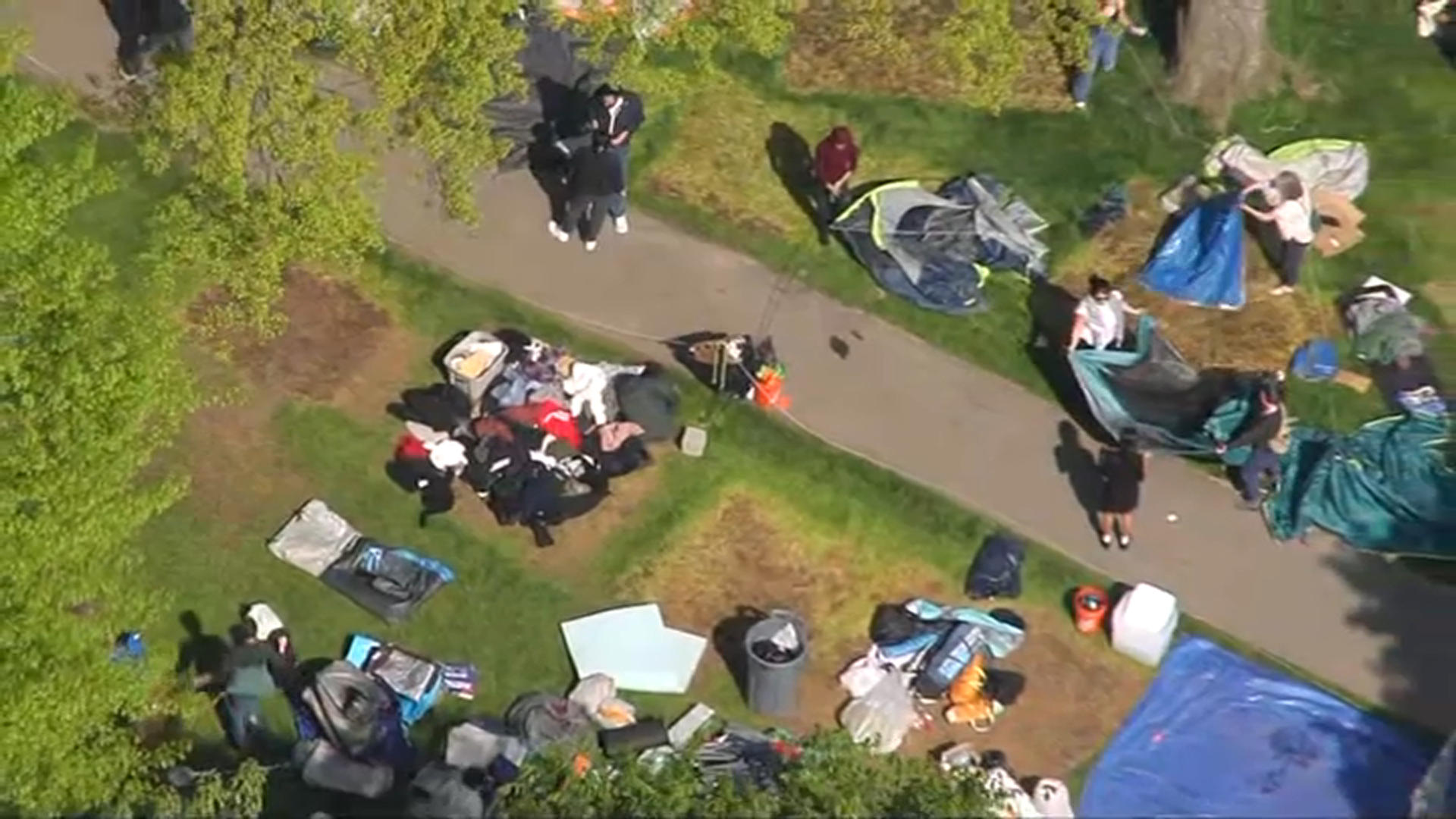Vocal and silent protests surrounded the gates of Harvard Yard in Cambridge, Massachusetts, on Thursday, as Harvard University held its commencement for the Class of 2024. Hanging over the graduates' caps and gowns is a cloud of controversy that follows a weekslong pro-Palestinian encampment that roiled tensions on the campus.
Those tensions were ticked up a notch on Wednesday when school officials announced that 13 Harvard students who participated in the encampment won’t be able to receive degrees alongside their classmates.
WATCH ANYTIME FOR FREE
Stream NBC10 Boston news for free, 24/7, wherever you are. |
Shortly before 11 a.m., a pretty large contingent of students and faculty walked out of the commencement ceremony chanting “Free, free Palestine” and “Let them walk, let them walk” – making it clear that the controversy and unrest is far from over.
Student speaker Shruthi Kumar said "this semester our freedom of speech and our expressions of solidarity became punishable,” she said to cheers and applause.
Get updates on what's happening in Boston to your inbox. Sign up for our News Headlines newsletter.
She said she had to take a moment to recognize “the 13 undergraduates in the class of 2024 who will not graduate today,” Kumar said to prolonged cheers and clapping. “I am deeply disappointed by the intolerance for freedom of speech and the right to civil disobedience on campus.”
Over 1,500 students had petitioned, and nearly 500 staff and faculty had spoken up, all over the sanctions, she said.
“This is about civil rights and upholding democratic principals,” she said. “The students had spoken. The faculty had spoken. Harvard, do you hear us?”
Faculty members voted Monday to allow the 13 to receive their degrees despite their participation in the encampment, but they were overruled by the school's top governing board.
The Harvard Corporation said that each of 13 had been found to have violated the university’s policies by their conduct during the encampment protest.
“In coming to this determination, we note that the express provisions of the Harvard College Student Handbook state that students who are not in good standing are not eligible for degrees,” the corporation said in a written statement.
The statement left open the possibility of an appeals process saying the corporation understands “that the inability to graduate is consequential for students and their families” and supports the Faculty of Arts and Sciences’ intention to provide an expedited review of requests for appeal.
“We care deeply about every member of our community — students, faculty, staff, researchers, and alumni — and we have chosen a path forward that accords with our responsibilities and reaffirms a process for our students to receive prompt and fair review,” the statement added.
The protesters against the war between Israel and Hamas had called for a ceasefire in Gaza and for Harvard to divest from companies that support the war. They voluntarily dismantled their tents after they said university officials agreed to discuss their questions about the endowment, bringing a peaceful end to the kinds of demonstrations that were broken up by police on other campuses.
Supporters of the students said the decision not to allow them to receive degrees at commencement violated a May 14 agreement between interim President Alan Garber and the Harvard Out of Occupied Palestine coalition that would have allowed the students to graduate.
The group issued a statement late Wednesday saying the decision jeopardizes the post-graduation lives of the 13 students.
“By rejecting a democratic faculty vote, the Corporation has proved itself to be a wholly illegitimate body, and Garber an illegitimate president, accountable to no one at the university,” the group said.
“Today’s actions have plunged the university even further into a crisis of legitimacy and governance, which will have major repercussions for Harvard in the coming months and years,” the group added.
Harvard Assistant Professor of Psychiatry Dr. Malak Rafla told NBC10 Boston that she personally thinks the level of disruption that was caused by the encampment was not significant enough to warrant the disciplinary actions.
Students like Margaret Mano agree.
“It’s just sad, it’s very disappointing, I think in the past there’s been many student protests, many student movements and they’ve never been met with disciplinary action because you know we have a right to protest,” said Mano, who is graduating from Harvard. "It is bittersweet, people in my house, my friends they can’t graduate with me."
Kathy Roberts, an educator from Cambridge said, “Harvard has gone overboard here and they’re going to pay for it.”
“It just shows the mask is off and Harvard is being led by money and profits and shame on [President Alan] Garber,” Harvard alum Lily Grove said.
For some of the students graduating Thursday, and their loved ones on hand to support them, any disruption is just part of the process of learning and living in a free society.
Tiffany Patel, who was graduating from Harvard grad school, said, “I think having this kind of discourse in whatever way is kind of the embodiment of what higher education is supposed to be.”
“That’s life, that’s reality and honestly for those that are graduating from the undergrad and heading out into the real world, I think it’s a true test of what life is going to be like,” said Tavia Foster Evans, whose brother-in-law is graduating.
There was a noticeable presence of police officers around the campus Thursday mixing with soon-to-be-graduates, their family members and sidewalk flower sellers.
“It’s really important that we just stay peaceful and stay calm and take this as an opportunity to celebrate and gather with our loved ones,” said Ariel Cao, also graduating from Harvard on Thursday.
A small plane circled above trailing an Israeli and U.S. flag. A truck was parked outside the campus with an electronic billboard with the names and images of some of the pro-Palestinian protesters under the banner “Harvard’s Leading Antisemites.”



